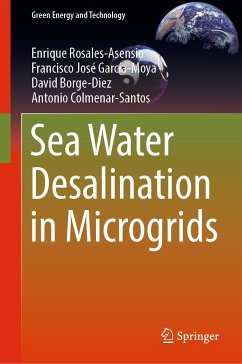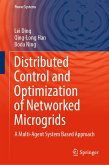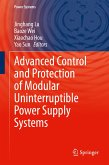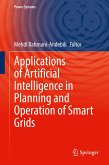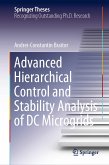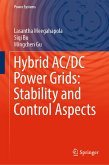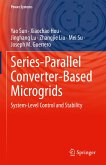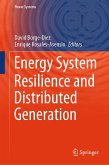Sea Water Desalination in Microgrids (eBook, PDF)

Alle Infos zum eBook verschenken


Alle Infos zum eBook verschenken

Sea Water Desalination in Microgrids (eBook, PDF)
- Format: PDF
- Merkliste
- Auf die Merkliste
- Bewerten Bewerten
- Teilen
- Produkt teilen
- Produkterinnerung
- Produkterinnerung

Hier können Sie sich einloggen

Bitte loggen Sie sich zunächst in Ihr Kundenkonto ein oder registrieren Sie sich bei bücher.de, um das eBook-Abo tolino select nutzen zu können.
This book investigates the sustainability performance of system that use microgrids in desalination processes. Climate change may be especially dramatic in its effects on island environments. In these environments, aquifers and wells could become over exploited resulting the use of desalination plans. The synergies between water, energy, and food sectors have been identified as vital in achieving the United Nation's Sustainable Development Goals.
The book explores desalination and microgrids technically as well the economic and legal aspects that must be considered in order explore their…mehr
- Geräte: PC
- ohne Kopierschutz
- eBook Hilfe
- Größe: 6.21MB
![Distributed Control and Optimization of Networked Microgrids (eBook, PDF) Distributed Control and Optimization of Networked Microgrids (eBook, PDF)]() Lei DingDistributed Control and Optimization of Networked Microgrids (eBook, PDF)97,95 €
Lei DingDistributed Control and Optimization of Networked Microgrids (eBook, PDF)97,95 €![Advanced Control and Protection of Modular Uninterruptible Power Supply Systems (eBook, PDF) Advanced Control and Protection of Modular Uninterruptible Power Supply Systems (eBook, PDF)]() Advanced Control and Protection of Modular Uninterruptible Power Supply Systems (eBook, PDF)129,95 €
Advanced Control and Protection of Modular Uninterruptible Power Supply Systems (eBook, PDF)129,95 €![Applications of Artificial Intelligence in Planning and Operation of Smart Grids (eBook, PDF) Applications of Artificial Intelligence in Planning and Operation of Smart Grids (eBook, PDF)]() Applications of Artificial Intelligence in Planning and Operation of Smart Grids (eBook, PDF)97,95 €
Applications of Artificial Intelligence in Planning and Operation of Smart Grids (eBook, PDF)97,95 €![Advanced Hierarchical Control and Stability Analysis of DC Microgrids (eBook, PDF) Advanced Hierarchical Control and Stability Analysis of DC Microgrids (eBook, PDF)]() Andrei-Constantin BraitorAdvanced Hierarchical Control and Stability Analysis of DC Microgrids (eBook, PDF)129,95 €
Andrei-Constantin BraitorAdvanced Hierarchical Control and Stability Analysis of DC Microgrids (eBook, PDF)129,95 €![Hybrid AC/DC Power Grids: Stability and Control Aspects (eBook, PDF) Hybrid AC/DC Power Grids: Stability and Control Aspects (eBook, PDF)]() Lasantha MeegahapolaHybrid AC/DC Power Grids: Stability and Control Aspects (eBook, PDF)113,95 €
Lasantha MeegahapolaHybrid AC/DC Power Grids: Stability and Control Aspects (eBook, PDF)113,95 €![Series-Parallel Converter-Based Microgrids (eBook, PDF) Series-Parallel Converter-Based Microgrids (eBook, PDF)]() Yao SunSeries-Parallel Converter-Based Microgrids (eBook, PDF)105,95 €
Yao SunSeries-Parallel Converter-Based Microgrids (eBook, PDF)105,95 €![Energy System Resilience and Distributed Generation (eBook, PDF) Energy System Resilience and Distributed Generation (eBook, PDF)]() Energy System Resilience and Distributed Generation (eBook, PDF)161,95 €
Energy System Resilience and Distributed Generation (eBook, PDF)161,95 €-
-
-
The book explores desalination and microgrids technically as well the economic and legal aspects that must be considered in order explore their techno-economic feasibility - analyzing how to improve the desalination process, proposing a method to locate and size a microgrid. Other synergies between the water, energy, and food system are discussed and the benefits to society that might result in these systems. Also, the lessons learned are highlighted in the context of how they may apply to other sustainable enterprises.
Dieser Download kann aus rechtlichen Gründen nur mit Rechnungsadresse in A, B, BG, CY, CZ, D, DK, EW, E, FIN, F, GR, HR, H, IRL, I, LT, L, LR, M, NL, PL, P, R, S, SLO, SK ausgeliefert werden.
- Produktdetails
- Verlag: Springer International Publishing
- Seitenzahl: 221
- Erscheinungstermin: 21. Februar 2022
- Englisch
- ISBN-13: 9783030966782
- Artikelnr.: 63486577
- Verlag: Springer International Publishing
- Seitenzahl: 221
- Erscheinungstermin: 21. Februar 2022
- Englisch
- ISBN-13: 9783030966782
- Artikelnr.: 63486577
- Herstellerkennzeichnung Die Herstellerinformationen sind derzeit nicht verfügbar.
Mr. Francisco José García Moya is Industrial Engineer with postgraduate degrees in electrical engineering, business administration, and quality, health, safety and environment management systems. Currently, he is Researcher at the University of León, where he is involved in water desalination project in which the resulting surplus electricity and water would be sold. He has also worked as Design Engineerof renewable projects.
Dr. David Borge-Diez has a Ph.D. in Industrial Engineering and a M.Sc. in Industrial Engineering, both from the School of Industrial Engineering at the National Distance Education University (UNED). He is currently Lecturer and Researcher at the Department of Electrical, Systems and Control Engineering at the University of León, Spain. He has been involved in many national and international research projects investigating energy efficiency and renewable energies. He has also worked in Spanish and international engineering companies in the field of energy efficiency and renewable energy for over eight years. He has authored more than 25 publications in international peer-reviewed research journals and participated in numerous international conferences.
Dr. Colmenar-Santos is Senior Lecturer in the field of electrical engineering at the Department of Electrical, Electronic and Control Engineering at the National Distance Education University (UNED by its acronym in Spanish); from June 2014, Dr Colmenar-Santos obtained a favourable resolution from the National Agency for Quality Assessment and Accreditation of Spain (ANECA by its acronym in Spanish) to be habilitated as Full Professor. Dr Colmenar-Santos has been Adjunct Lecturer at both the Department of Electronic Technology at the University of Alcalä and at the Department of Electric, Electronic and Control Engineering at UNED. He has worked for AECI-ICI as high-qualified Consultant at the INTECNA project (Nicaragua) and been part of the Spanish section of the International Solar Energy Society (ISES) and of the Association for the Advancement of Computing in Education (AACE), working in a number of projects related to renewable energies and multimedia systems applied to teaching. Dr Colmenar-Santos has been Coordinator of both the virtualization and telematic services at ETSII-UNED, as well as Deputy Head Teacher (administration), and Head of the Department of Electrical, Electronics and Control Engineering at UNED.
Dr. Colmenar-Santos is Author of more than 80 papers published on top peer-reviewed journals. He has participated in more than 100 national and international conferences related to renewable energies and multimedia systems applied to teaching. As a result of his extensive experience of more than 30 years as Full-Time Teacher, he has missed out in the subjects where he is Main Teacher; most of these are related to Energy, a book that would specifically explore the application of nonlinear global stochastic optimization for the optimization of the sizing of renewable facilities attached to a reverse osmosis desalination plant in order to achieve the lowest cost of producing electricity and water or simply providing the maximal benefit regardless of the operation. This text would fill the literature knowledge gap. As a result, it would be of interest to the following readers: undergraduate and postgraduate engineering students, professionals in the field of microgrids and smart grids, and energy policymakers.
